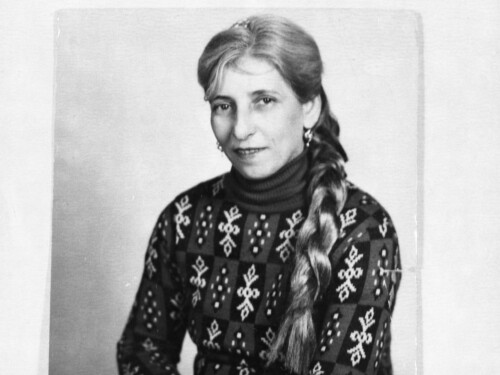Homepage | Roma and Sinti testimonies (original) (raw)
Testimony 1
In 1942, when Alžbeta Danielová was sixteen years old, the Germans arrested the whole family. Their fellow citizens cried when they were taken away. They were fingerprinted, photographed, and a record was taken at Denisovo nábřeží [Denis Quay, in the building of the former police headquarters (ed.)]. The family assumed that they would be sent to work, not to die. From Pilsen they were taken to Lety, where they spent about eight months; from there they were transported by cattle wagon to what…
- Anežka Klaudová
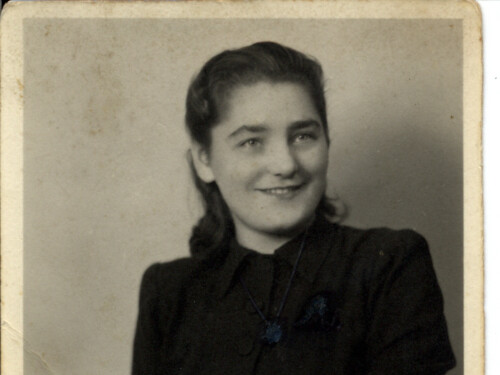
During the war, Anežka Klaudová went to live with her paternal uncle in Zlín. She worked at the Baťa factory in a warehouse under Gestapo supervision. Her family had to go to the assembly point in Hodonín, where a committee was to decide who would be transported to the Auschwitz II-Birkenau concentration camp. Her brother František dared to ask about the reasons for the transport, and she said that was why he was the only one of the family who was sent. He reached the camp in May 1943, and a… - Anna Kýrová
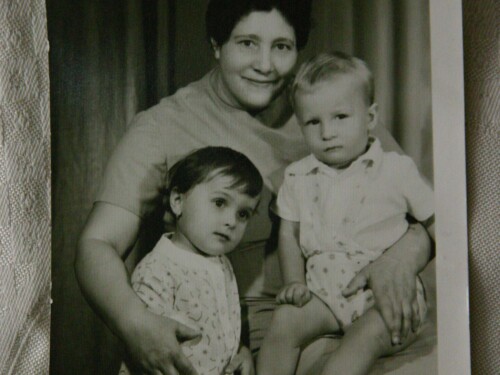
During the war, Anna Kýrová was warned of her arrest by her teacher, Ms. Hudečková. However, the family was arrested anyway and taken to Olomouc, to a collection point for the assembly of the transport. The Roma from Strážnice, who were well integrated into their home village, were given the opportunity to contact their mayor by telephone, who was able to vouch for them and, as it were, reclaim them from the transport. The connection failed, however, as the mayor allegedly allowed himself to be… - Berta Berousková
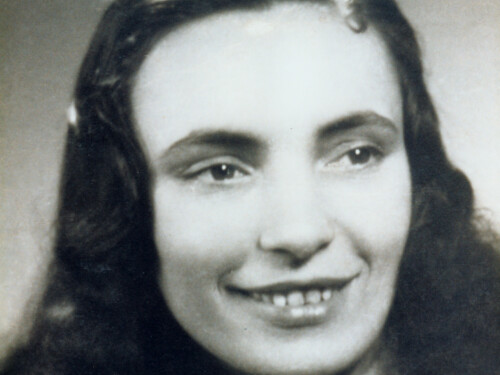
Testimony 1
The gendarmes told Berta’s father[1] that they could not stay [in Prostějov] and had to go to Mezilesí, where they had domicile rights. A local gendarme then informed her father that they would go there to work, stay for about six months and then return. Her father believed the story, so they went there with a cart and horses, and with the wagon, but it turned out to be a camp called Lety.[2] Berta's grandfather Robert Čermák (born 1878) was already in the camp; she said he used to play cards…
- Emílie Machálková
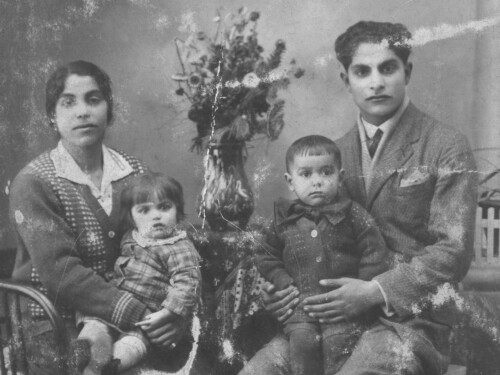
In 1940, Emílie Machálková and her brother Miroslav were put to work in a factory, she in Slavkov, her brother in Bučovice. Because the work in the factory was medically hazardous, the brother fell seriously ill, but the doctor wrote a certificate about tuberculosis and he was able to stay at home and study until the end of the war. In March 1943, some men [probably gendarmes] came for the Holomeks in Kyjov, Sobůlky and Svatobořice. They took the grandparents, their sons Stanislav, Štěpán and… - František Daniel
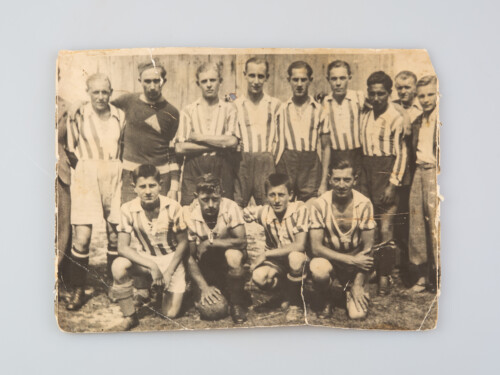
In 1941 or 1942, the municipalities were supposed to select people to be transported,[1] and according to Daniel in Moravia they were mostly Romani people. The Daniels were the only Roma family in Chvalkovice, so they took František’s father and two brothers-in-law to the headquarters in Brno.So they went to a Czech Roma named Nový[2] begging him to get their father released as he supposedly had a great deal of influence, but he did not arrange anything and they were afraid they would be kept… - František Vrba
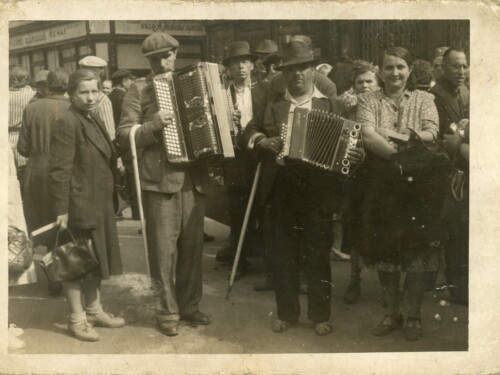
František Vrba knows more about what it was like during the war from the stories his mother and father used to tell him about the past. When the extended family gathered, the aunts and uncles would tell stories and cry, but as a child he was not allowed to listen to these conversations.[1] He remembers the camp [the so-called gypsy camp in Lety u Písku], how his blind father could not move around on his own and how Vrba's sisters[2] took him to the toilet. They would go swimming en masse in the… - Helena Malíková
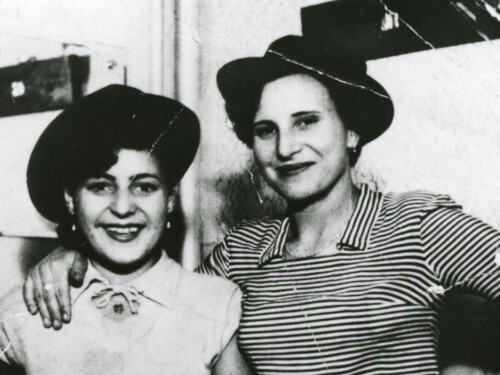
Helena Malíková, her sister Maria and her foster father were interned in the so-called gypsy camp in Hodonín u Kunštátu. In August 1943, she took part in cleaning up after the transport that took most of the imprisoned Roma and Sinti to the Auschwitz II - Birkenau concentration camp. Malíková was deported to the Auschwitz II-Birkenau camp from Brno in the last mass transport of Roma and Sinti from the Protectorate, which was dispatched on 28 January 1944. In the concentration camp, they carried… - Hilda Laníková
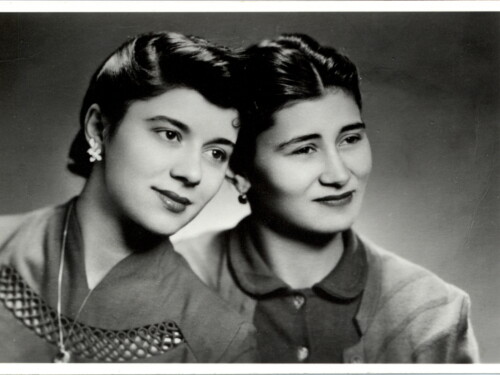
Hilda's father was the first of the family to be arrested in the spring of 1942. He was taken to Auschwitz concentration camp and the family never saw him again. This left her mother alone to care for her large family and dependent on occasional work and support from the community. In the autumn of 1942, the whole family was interned in the so-called Gypsy Camp at Hodonín u Kunštátu. Hilda was a little girl at the time, so she remembers mainly the constant hunger and the bad food. She said that… - Jan Bystřický
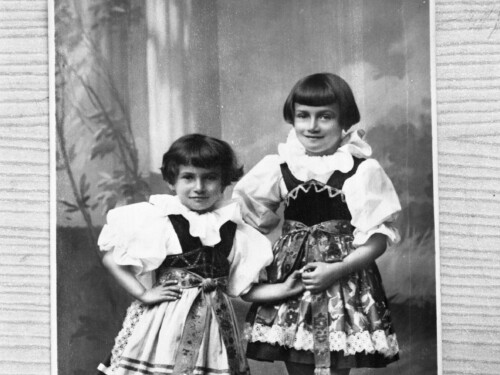
Jan Bystřický's father was a carter at Kozí horka in Vyškov.[1] His father's classmate Veselý worked there as a police chief, and he warned the Bystřický family[2] that the Gestapo would come for them next morning or in the night. The father therefore killed two or three pigs, quartered them and distributed the meat to the children in their backpacks. After that, the family hid in the Buchlov woods. One day Jan’s mother, his eldest sister and his aunt went to the village to buy bread, but a… - Josefa Štěpánková
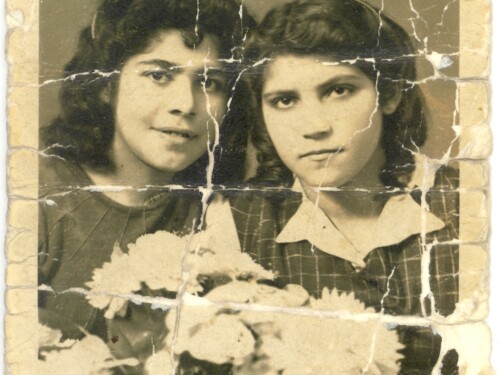
Testimony 1
She says that after the arrival of Hitler[1] they were no longer allowed to make a living this way and had to settle in Žďár, where they lived in covered wagons. Her father broke stones, and her mother helped in households and in the fields. Josefa Štěpánková, who was fourteen at the time, worked for a local farmer. In 1942, gendarmes from Sloup came in the middle of the night, forced them to pack only the bare necessities and took them to the so-called Gypsy Camp at Hodonín u Kunštátu. At that…
- Karolina Kozáková-Vdolečková
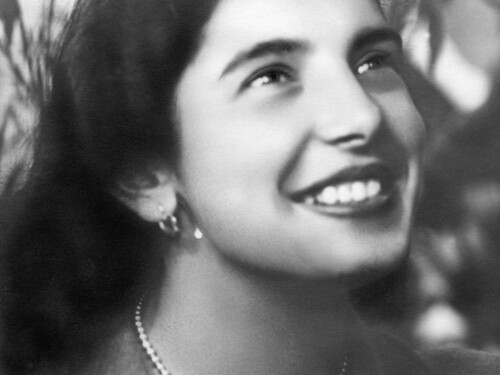
In 1939, her parents saved enough money to buy a two-room house. The family settled in Zdaboř[1] in one of five houses by the road. Here Karolina Kozáková-Vdolečková started first grade and her older siblings were able to attend school in nearby Březové Hory.[2] The family built a solid position in the village and maintained good relations with others. One day, a local gendarme came to warn them that they might be taken to a concentration camp and advised them to go to Slovakia. But the family… - Marie Ondrášová
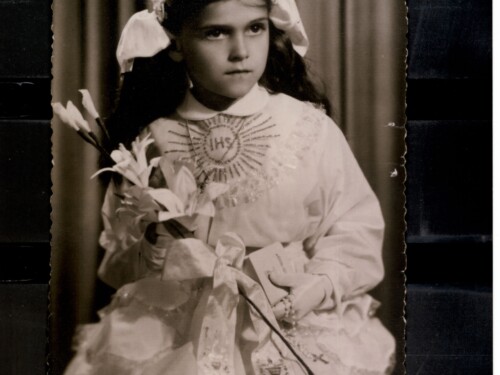
One day a truck arrived and took them to Přerov, where many Romani people were already gathered in the school building. Marie Ondrášová, then 16, was given the task of keeping the place clean. While the other Roma had been told about the upcoming transports and had managed to prepare bread, lard and potatoes for the journey, the Ondráš family was caught unprepared. After a week, all the Romani people were transported in freight cars called “pig wagons” to Hodonín u Kunštátu. From there, the… - Vlasta Danielová
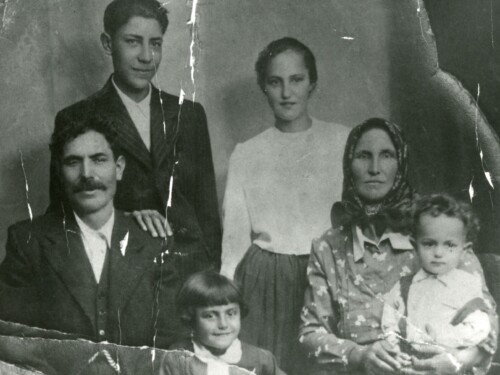
Testimony 1
The family could not imagine that they might be subject to similar restrictions as the Jews. Vlasta’s mother, a Slovak, said that if worse came to worst they would flee to Slovakia, but the father said they had no reason to run away as they had not killed anyone. Vlasta’s brothers Izidor and Stanislav were soon sent to forced labour – Izidor to Linz, where he could go home every month on leave, and Stanislav to Dresden.[1] The surrounding Roma began to be taken away in 1942, mainly from Staré…
- Agnesa Horváthová
When Horváthová was about fourteen years old,[1] the Hlinka Guards (including a local farmer who joined them) drove the Roma from Chmeľov into the forest at Petič. She stopped going to school - her parents were elderly and afraid to let her go to the village. They built a poor house out of wood in the forest and stayed there for about a year; she remembers that there was mud everywhere.[2] Irena Kroková's family stayed in Chmeľov, where they were quite well off because they worked for rich… - Aladár Kurej
[Aladár Kurej's testimony concerns only the period after the war.] - Aloisie Blumaierová
When the Roma from the area were gradually taken to Hodonín [u Kunštátu], Aloisie’s mother wanted the family to go to Slovakia, where the situation was calmer than in the Protectorate, but her father refused to leave Bořitov. At the beginning of 1943, gendarmes from the nearby market town of Černá Hora came to their home, told them to pack everything they could carry, and took Aloisie, her parents and her younger brother František to the slaughterhouse in Brno.[1] They spent three days in a… - Alžběta Danielová
Testimony 2
When Danielová was 16 years old, she moved with her mother and brothers, plus a little sister, to an apartment on Jateční Street in the Doubravka district of Pilsen. In 1942, the entire extended family, including her grandmother and her mother's four sisters, were taken by the Germans.[1] They thought they were going for work. When they were taken away, people cried. They were photographed and fingerprinted on the Denis Embankment in Pilsen, then they were in the school building on Jirásek…
- Anastázie Bystřická
Gendarmes from the gendarmerie station in the village of Černotín came for the family.[1] The gendarmes told them to pack, but to take only essentials, as they would return immediately. At the station in Černotín they were photographed and their personal details were recorded. From there they were taken to the prison in Hranice, where other Romani families had been taken, and then to Olomouc, where they stayed in a building that Bystřická likened to a courthouse with large rooms. She didn’t… - Andrej Giňa
When Giňa was around six years old, the gendarmes came with the Hlinka Guard and told his father that the Roma had to move out of the village as fast as possible to a place called Pod Hinteškou, about two or three kilometres away. They had to dismantle their houses and the farmers carried the material for them so they could build some provisional shelters in Pod Hinteškou. Giňa said the farmers cheated them, because according to the agreement they should also have built the houses for them. He… - Andrej Kešel
Andrej Kešel described how the local commissar was angry with the Roma and that everyone in the parish stuck by the Germans. They reported the Roma to the gendarmes who in 1940 surrounded the house and took him away with three other men to Michalovce [Kešel had the wrong date here; conscription to the labour camps did not begin until 1942 (ed.)]. The other three Roma were released for health reasons but Andrej Kešel ended up in the labour camp Revúca. According to him there were roughly the… - Andrej Kišš
According to his own words, Andrej Kišš was taken to a forced labour camp at the age of twenty-seven or twenty-eight.[1] At that time he was already married and had a small daughter. He knew about the labour camps. During his year’s military service had had seen Roma and Jewish prisoners in the stone quarry in Sväty Peter. At that time Kišš worked on land reclamation for the watercourse administration. The Hlinka Guards came for the Roma in the night and took them away to Michalovce. From there… - Anna Cinová
Anna Cinová’s two sons were taken away by gendarmes and the Hlinka Guard to Prešov, It was supposed to be something similar to military conscription. One of them was released for health reasons.[1] Her other son Jan was taken to the Petič camp. He worked on the construction of the railway track at Lipníky. Cinová described the conditions of those interned; above all the hunger, the hard labour and the constant beatings. They were given food once a day and so every day she or her daughter-in-law… - Anna Růžičková
Around 1942, Anna Růžičková's father received a warning from Ulrich, a policeman in Březové Hory, that they would "go to the camp" and recommended him to join the partisans. But the father refused, because they were expecting the birth of a son at any time. Because of the air raids, the family stayed in their house in Zdaboř, which was situated apart, close to the forest. At 4 o'clock one morning, Czech gendarmes came for them with someone in a German uniform and took them to the prison in… - Anna Virágová
Six or seven Roma from the vicinity of the village of Sklabiná were taken to the camp in Dubnica nad Váhom.[1] Among them was Jano, a Romani boy with whom Virágová grew up and who later returned home. Anna’s brother Anton had to enlist in the Slovak army during the war,[2] although he had not yet finished college. He was in the barracks in Ružomberok for six months, then he was taken to the front in Russia, where he spent six years; according to Virágová, he was captured there and with the… - Antónia Pustajová
The Grosmír family were, like the other Jews, taken from the village one night by trucks and the Hlinka Guards began looting their home the next morning. Pustajová believed that if the Grosmír women had known that their property would end up in the hands of the Guards, they would have preferred to give it to the Roma, with whom the Jews sympathised. She also says that they cried for them. After one raid on the partisans and their supporters in the adjacent hills, the Germans locked up the… - Antonie Kroková
The family was unaware of the existence of the camps until their deportation in 1942. Antonie Kroková says that mixed families were chosen,[1] and that her father tried to resist, and attacked a German. They gathered them in a courtyard in Beroun, where they photographed them, took their fingerprints and wrote down their details. They were allowed to take items weighing up to 25 kilograms on their journey. They were then transported by lorry together with others to the concentration camp in… - Antonín Absolon
Absolon remembered hearing at home that the Roma were being imprisoned in Hodonín, but paid no attention. At 5 a.m. on a day in March 1943, German soldiers surrounded the Roma houses in Slatina. Absolon's mother spoke German, and talked to the soldiers; they said they would return home again. The family was taken in police cars to the slaughterhouse in Brno and locked in the stables. Along with the Růžička family, the soldiers took their grandmother Maria and Antonín Nový – who later perished… - Antonín Daniel
In addition to the Daniels, the Růžička family also lived at Žebětín during the war. They were forced to settle in the village (according to a Protectorate decree), and found work there, living in covered wagons. Later they were deported to the camp in Hodonín near Kunštát. The neighbours were distressed when the village received the call to transport the Daniels to the Auschwitz concentration camp. The mayor [Jan] Stejskal was a close friend of all four of the Daniels' children. They managed… - Antonín Hlaváček
During the war, Antonín Hlaváček was sent to a reformatory in Opatovice nad Labem. He said it was because he was “a street urchin”. In 1943, together with seven other boys from the reformatory in Opatovice, he was taken by the Protectorate gendarmes to the camp at Lety near Písek. Hlaváček recalled that the gendarmes in the reformatory chose the boys according to their skin color, so they also took with them two boys named Procházka and Zikmund, who were not Romani although they were… - Antonín Murka
When Murka was getting ready for work on August 1, 1942, a gendarme came for him and took him to the station in Lípa.[1] There he had to join the transport from Vizovice to Hodonín [to the so-called Gypsy camp]. In the carriage he met his mother's relatives, who had been arrested in Vizovice the day before. They got off the train in the village of Nedvědice and walked over the hill to the camp. Upon arrival, chaos ensued, with the gendarmes beating the prisoners with batons to force them to… - Antonín Vintr
Antonín Vintr's family was imprisoned in the camp in Lety u Písku;[1] they were allowed to take only the bare necessities with them, but then they had to leave all their suitcases at the school [in the village of Lety u Písku] where they were accommodated for two days before being assigned to the camp. When a transport of Roma arrived in Lety u Písku, they were first housed in the local school, their wagons were burned, and their horses were given to peasants. Then they all went to the camp… - Bartoloměj Daniel
When the Roma saw the Jews being taken away, they became afraid too. Various rumours spread among people, such as that the Fascists and the Hlinka Guard were preparing a new place for the Jews to live, but a paper boat for the Roma to drown at sea. The Roma then became restless and feared for their children. Their fears were reinforced by the flight of Roma from the Protectorate [of Bohemia and Moravia] to Slovakia - at first they hid them among themselves, but when the repression intensified,… - Berta Berousková
Testimony 2
The family had right of abode at Mezilesí near Pacov, where the mayor allowed them to park their covered wagons on a plot of land near the pond and build a stable for their horses. Berousková’s father and grandfather worked in the local forest and used their horses to drag the felled trees out of the forest. The gendarmes from Pacov enquired after the family; the mayor vouched for them, but they were later found by other Czech policemen[1] and told to pack up and go to work on a state farm for…
- Berta Krausová
During the war, the Kraus family were warned by a Czech gendarme about the transports. From about March to May 1943 they hid in a wagon in the vicinity of Snovídky, Bučovice and in the Buchlovy [probably Buchlovice] woods. Sometimes they hid in the barns of the local inhabitants, sometimes they were able to sleep at the house of a gamekeeper. Eventually they took refuge at the home of their grandmother Mrs Richterová at Dobšice near Znojmo. During the war, Berta Krausová and her future husband… - Bertín Demeter
Bertín Demeter mentioned how his uncle Petres collaborated with the Germans, informing on members of his own family. He described how his mother went on foot to Demeter’s older brother, known as Vašek, in the Legaň labour camp. He talked about events at the end of the war, the fighting between the Russians and the Germans, including at Dukla Pass with many casualties on both sides. - Bohuslav Kýr
Bohuslav Kýr started working for the Baťa company in Zlín in 1939 as a worker on the construction of the railway line to Vizovice. After a while, about sixty workers were sent to a labour camp in Linz, but typhus broke out there and he fled. In 1941, he reached Koblenz, where he found work in a fireclay factory, but he did not like it there, and about November, he says, he again fled. He was caught at the Protectorate border, arrested and imprisoned; he was released in January 1942.[1] He… - Božena Pflegerová
Božena Pflegerová recalled that in 1938 there were rumours that an “inventory of gypsies and travelling people” was to be taken. Her father brought a newspaper from the mayor that mentioned a proposal to sterilize Romani women, but she said Masaryk rejected the proposal.[1] Nevertheless, they started to issue “gypsy identity cards” and took inventories. Božena Pflegerová’s parents, as well as a brother and a sister, were issued with identity cards, even though they were already settled. [At the… - Božena Růžičková
When Růžičková was taken from Lobeč to Lety, she was pregnant. The the Roma were taken together by train and upon arrival they were shaved to the skin. Růžičková recalled the director[1] admitting them the next day and telling them, "The gate has opened in front of you, the gate has closed behind you - and from here there is no return." There were wooden barracks in the camp. The prisoners slept on tiers of bunks and were given blankets. The [warder Bedřich] Pešek was in charge of the camp… - Božena Valdová
When, as she said, it was about to happen [meaning the arrests and transports], they fled to Lidečko in Moravian Wallachia, where they hid in someone’s home,[1] and later in the forest. The local gendarmes knew about them but left them alone. It was only when the Heráks were denounced – allegedly by a Romani man originally from Žeranovice – that the gendarmes took them to police headquarters in Brno on the basis of an arrest warrant, and from there, after about a month, to “Hodonínek”. She went… - Dezider Daduč
Daduč recalled that when the war started in 1939, nothing really happened in Pozdišovce. The Germans only marched on Ungvar (also known as Užhorod), on Russia and on Ukraine, and the Roma threw flowers at their tanks. The first two years of Slovakia's independence were still good; the turning point came when the Hlinka Guard took power in 1941. In the same year, they started to take the local Jews away. One of them managed to get off the train and join the partisans, where he gained the rank of… - Eduard Daniel
In March 1943, all the Romani people were summoned to the Oslavany gendarme station. While they were being registered and fingerprinted, Eduard Daniel noticed that the list was marked "Auschwitz". Daniel's family lived in a settlement in Oslavany, which had about seventy inhabitants. Some of them were taken to the camp in Hodonín near Kunštát as early as August 1942, from where they were released again thanks to bribes. This was also the case of Eduard Daniel. But they did not enjoy their… - Eduard Holomek
Everything began to deteriorate with the arrival of German troops. Around 1941, his former classmate Cyril Dufek, from a German family, came to Eduard Holomek and told him that the Holomeks would be sent to a concentration camp. Because he worked at the employment office, he was able to arrange a job for Eduard in Vienna, and thus an exemption from the transport. Holomek was hesitant because he had never travelled by train before, so Cyril Dufek sent another classmate with him to Hodonín, who… - Elena Lacková
Testimony 1
Elena Lacková briefly described how all the Jews were rounded up and taken away, and how the Roma escorted them out. The local Slovaks just looked out of the windows, and Lacková concluded that they were probably afraid of the guards. She and her friend Olga Engländer cried the last time they saw each other. Olga managed to escape from the transport and wanted to go to Hungary, but was shot on the Slovak-Hungarian border. Jewish property was confiscated by the guards. According to Elena…
Testimony 2
Elena Lacková described what the declaration of the Slovak state meant for the Roma and how the new measures affected their lives so far. Roma faced public ridicule from non-Roma; their freedom of movement were restricted, and they were not allowed to remain outside their home village. A drummer came and announced that they could only go to Veľký Šariš between noon and 2.00 p.m. and that they could not go to the more distant and larger city of Prešov at all. Lacková mentioned a prison wagon,…
Testimony 3
Elena Lacková described a young Roma partisan in the locality of Nižná Pisaná, who reached the First Czechoslovak Army Corps by crossing Poland, Russia and Ukraine. Lacková described the fighting at the Dukla Pass, where this man was wounded by a grenade and lost his arm. When he visited the cemetery at Dukla to remember his friends, he discovered that because his papers were found near his arm, his own name was among the fallen. Lacková said there were a lot of Roma in Svoboda’s army and that…
Testimony 4
Roma were taken[1] from the settlement of Veľký Šariš, where Elena Lacková grew up, into the so-called coffee army. Roma were similarly taken from the village of Stuľany. They had to build railway lines and highways. Lacková described how the Roma in the military labour unit rebelled when, unlike other soldiers, they were not allowed to go home for Christmas. She described the oppression by the military guards, the beatings and the verbal humiliations as further motives for the rebellion. Among…
Testimony 5
Elena Lacková recalled how before the fighting began the Hlinka Guards had driven the Roma from Chmeľov into the woods. When asked about a Romani partisan named Oračko, she said that he told her that there were four local men in the partisan group with him. She also mentioned the Horváth musicians who were killed.[1] [1] According to Agnesa Horváth, it probably happened during the bombing of the prison in Prešov. See her testimony in the database.
- Eleonora Kosová
One evening in 1942, her parents began packing their belongings, saying that the local gendarme had urged them to run away, otherwise they would have to go to a concentration camp. They left at night, then walked through the woods and along field paths, and finally took refuge in the forest around Buchlov. Her uncle Adolf Richtr and her father's cousin Jakub Richtr from Vyškov fled together with the Bystřickýs. One spring or summer morning in 1943, while they were spending the night close to… - Emílie Danielová
In 1942 Emílie Danielová was taken to Brno [to the provincial compulsory labour facility in what is today Lidice Street (ed.)], where they shaved off her hair – including under her arms and elsewhere, as she said herself – and from there to Hodonín, where the prisoners broke up stones for paving highways. They were beaten by the gendarmes, but Emílie Danielová said that those Roma who held some position in the camp treated them worse. Emílie’s husband Hynek Daniel tried to visit her in Hodonín,… - Emílie Hanáková
When World War II broke out, Emílie Hanáková was already married [to Otakar Herák] in Luhačovice and had a small child. She believed that if she had still been living with her parents in Lhota, she could have been spared the concentration camp, because the local police inspector Nejezchleba had warned her parents in advance that the Germans were intending to deport them. He even left them their so-called Gypsy identity cards and their father considered fleeing to Slovakia to live with his… - František Holomek
František Holomek was assigned to a transport on 3 March 1943. Before that he had worked in Vienna, and so in Veselí nad Moravou he went to see a police officer called Samek from Vracov, saying that he needed to return to Vienna, where he had some money. But Samek told him he had to go, and so he and his whole family – his first wife and their four children – arrived at the Na Lapači inn in Veselí, from where they were taken to the Sokol centre in Staré Město near Uherské Hradiště and then by… - František Klempár
František Klempár was conscripted in 1943. He was assigned to the army, but to a work unit – like about twenty other Roma, he was given a uniform and received training, but was not given a weapon. Three months later, the Germans came and selected men for the front in Italy.[1] František Klempár was also supposed to go to the front, but he was sent back. Before Christmas, he said, they handed out identity cards to the men. Those who had: "Nationality: Slovak – race: Gypsy" written on them were… - František Kotliar
Kotliar recalls the non-Roma engineer Diakovský[1] from Gelnice, who provided work for the Richnava Roma during the war. He therefore explained [to the local authority] that he needed them and thus saved them from the labour camps. Kotliar says that the Roma in Richnava escaped, for example, the hair cutting which was a frequent punishment. Kotliar says he helped his father in making cramp irons, horseshoes, nails and the like. When the Jews were deported the family was brought to its knees, as… - Františka Zimová
About three or four young Roma from Kopčany were taken to Dubnica [nad Váhom],[1] and worked in the limestone quarry. They went there instead of going into the army, but they all returned home.[2] There were many Hlinka Guards among the Slovaks in Kopčany, and they treated the Roma very badly, beating them with batons, forcing them to clear faeces off the ground in the settlement with their hands, or making them stand barefoot in the snow for an hour. Zimová said the guards behaved like… - Gizela Dirová
Gizela Dirová describes how during the war the Germans mistreated the Roma, raping young girls, and how everything was scarce, food and clothing. When her husband left for the front, she remained alone with a year-old child; she lived with her husband's father and his partner. She went begging to Slovaks with her son on her back, telling them that she had a man at the front, but that they were not married and so she was not getting support (we were just living "in faith", she explains). People… - Hedvika Heráková
Hedvika Herakova's first husband was taken [by transport on 28 January 1944 (ed.)] together with their four-year-old son to a gypsy camp[1] where they both died. As she was in an advanced stage of pregnancy, she herself escaped the decreed transport from the village of Újezd where they had a house. She therefore ended up in custody in the prison of the police headquarters in Brno, and was taken from there to the municipal maternity hospital. After giving birth[2], she was again taken to prison… - Helena Bílá
Helena Bílá described the village before the war, when a lot of Jews lived there. Her father used to help out in the family of the local butcher. One day however they were all taken away in wagons by unspecified persons. During the war there were members of the Hlinka Guard in Malé Kapušany. Helena Bílá particularly remembers the Maňkoš family. They were afraid of one of the Maňkošes[1] who had tried to rape Helena Bílá’s aunt. The Roma did not dare to enter the village; the only person from… - Helena Ondrášová
Helena Ondrášová was imprisoned with her mother[1] and siblings[2] in the “gypsy" camp at Hodonín near Kunštát. Ondrášová said the most traumatic experience was the arrival at the camp itself. They cut everyone's hair and the first one to be shaved was two-year-old Helena Ondrášová, while her mother held her in her arms crying. She begged in vain for her daughters not to have their hair cut, but her sister Hilda also lost her hair, which had been knee-length. The young children were… - Helena Študiová
Helena Študiová remembered that she already had five children when they took her husband off to a labour camp. According to her, they took eleven Roma altogether. Her husband was taken to Germany.[1] She described the time he was away as a time of hardship and anxiety about how to feed the children. Helena Študiová’s husband returned in bad shape about a year and a half later – he was brought by a non-Roma Slovak who carted the mail from Prešov. Študiová said that in the camp her husband… - Ignác Zima
Some Roma from Moravia managed to escape from the Protectorate to Slovakia, so they were saved. Some of them, such as such as Kýr,[1] Franta[2] and Karel[3] from the Union of Roma [Union of Romani-Gypsy], were even hidden by Slovaka. Ignác Zima's eldest brother was conscripted into the army and was captured in Russia, along with other Roma, such as Františka Zimová's brother Matěj. Local Roma partisans included Palko,[4] Ferda,[5] and also Izák.[6] The guards treated the Roma terribly. In the… - Imrich Bílý
The Roma from the settlement began to be bullied by the Hlinka Guard, in which even local peasants from the village, such as Juraj Foltýn and his brother, had enrolled. As well as beatings and having water or slurry poured over them, Bílý remembered a humiliating delousing operation when the Guards came with a mobile disinfection unit known as a “steamer” and they were all shaved to the skin. There were partisans hiding in the forests around the settlement, among them his uncle Balamutas on his… - Imrich Daško
Twenty-year-old Daško enlisted in the Slovak army in October 1943 in the town of Podolínec, but at that time Roma and Jews were thrown out of the army and he said they were placed in a labour camp.[1] Therefore he had to work with two other Roma on the construction of a railway line near the town of Stará Ľubovňa. Daško had an acquaintance there, a Slovak soldier, and so instead of working he was put on guard duty. He spent three and a half years in the army.[2] They were in the camp until… - Irena Kroková
During the war, Irena Kroková's family stayed in Chmelov, where they were well off because they worked for rich farmers, the Sučeks. Irena Kroková said that her father would not “for the world” have joined the partisans; she said that he was an excellent musician, just like the other Roma, and they would not disgrace themselves by hanging out in the woods all dirty and covered in lice. - Irena Tomášová
For Irena Tomášová's family, 1939 marked the end of freedom. [Jozef] Tiso, the Hlinka Party and the Hlinka Guard came to power. In her opinion, the Guards were worse than the Gestapo. They started persecuting people. In Tolčemeš they included a certain Skľepár,[1] his three sons Tomáš, Janko and Jura, and their children. They wore black clothes and high leather boots and began to persecute the Roma. One of them tried to rape her several times, even though she used to go to help him before the… - Ján Bartoška
Ján Bartoška learned about the labour camps in Slovakia and the conditions that prevailed there mainly from eyewitnesses who had managed to escape. There were labour camps in both Eastern and Central Slovakia, but the inhabitants of Central Slovakia were deliberately transported as far east as possible in order to make it difficult for them to escape. For example, someone could be put into a labour camp because he had resisted a high-ranking member of the local Hlinka Guard. Bartoška cites as… - Ján Cibula
Ján Cibula describes the restrictions that affected the Roma due to the war, and the threats from the Germans. At the time he was finishing primary school, Roma were no longer allowed to study at gymnasium but after his father intervened with the head teacher of the gymnasium in Tisovec he was accepted. He attended for a year or two, then the fighting started and he had to stay at home. Cibula described how the farmers in the village were angry with the Roma. Then the Germans came and when they… - Jan Horváth
Jan Horváth was about sixteen years old when he was called up in Svidník. He said it was probably in October 1939, because they were lifting potatoes in the fields at that time. Only Roma were conscripted. Horváth spent about half a year in the Petič labour camp in Hanušovce nad Topľou. The women, including Horváth’s mother, secretly brought them food. Jan Horváth remembered there were fewer Slovaks among the predominantly Roma prisoners; he remembered the low food rations, the beatings, the… - Jan Ištván (1921)
When Jan Ištván started school, the family settled in Kunštát, where his father had right of abode. They lived in two interconnected and well furnished covered wagons. His brothers Josef and Bohouš worked in the carting business there. Jan Ištván worked for the Schmidt company, for which he built the road and bridge in Kunštát. The Germans registered the family [after the occupation] in 1939. In the autumn of that year, Kohn, a local Jewish textile merchant, warned Jan Ištván's father that… - Jan Ištvan (1924)
Jan Ištvan recalls that when he was fourteen years old, the gendarmes came to his school to ask him to pick up his Gypsy identity card in Doubravice, but he did not go there because he had a Kennkarte. He says that some kind of inventory[1] was made by the gendarmes on the orders of the Protectorate authorities in the summer or autumn of 1942; it then served the Germans as a basis for selecting people [for transports]. In March 1943, the family was taken by a prison van to Brno to the… - Jan Růžička
In 1940 Jan Růžička was already doing forced labour in Austria in the Metall-Werke munitions factory. He said they sabotaged the work. He fled from there to his home in the village of Štěměchy, where he hid, and Dr. Hůlka[1] secretly treated his injured leg. He was then arrested by the German police in Jihlava, where his wife and two children had already been detained. They were put on a train and taken to Brno, where they were stripped and their hair was cut. They spent two days without… - Ján Tumi
Ján Tumi served as a soldier in the village of Oremov Laz. There were only four Roma among the soldiers. One of them was Andro Boldi from Mišán.[1] Then the Germans released them and he was at home. In 1944, when the [Slovak National] Uprising broke out, he volunteered to join the partisans in the village of Valaská in the agricultural school. There was a Russian general named Chernov, a Captain Mikhailov and their deputy Kozlov.[2] There were Russian women among the partisans; according to… - Jolanka Kurejová
[In 1942] the Hlinka Guard rounded up the local Jews, herded them into cattle cars and took them away – separating them into women, men, little girls, and little boys – Jolanka Kurejová called the latter “bucherici” [probably from the Yiddish word bocher for boy]. The Roma followed them to the station and cried for them. They left a lot of gold and furniture behind: everything they had saved was taken by members of the Hlinka Guard. Jolanka Kurejová mentions a family called Andij, whose three… - Josef Jelínek
Josef Jelínek had been living with his fiancée and nine-month-old son for only a month when on 15 March 1943, at midnight, he was dragged out of bed by a gendarme by the name of Vedra[1] and two men in leather coats. Without giving him a chance to say goodbye, they took him to the station, where he was reunited with his entire family in a railway wagon. They spent the night in the wagon, guarded by a German soldier with a machine gun; there were 50 of them in there and only one bucket in the… - Josef Serinek
After his release from prison, Serinek worked in several jobs before he was hired as a carter on the Rohy farm in the village of Bohy at the end of 1941. Here he even became involved in the trade union[1] and advocated fair pay for all employees. At the end of June 1942, Serinek and his family were subjected to anthropometric measurements by gendarmes from Liblín and on 2 August 1942 they were taken to the camp at Lety near Písek. They were allowed to pack only twenty kilograms of luggage each;… - Jozef Abrahám
Abraham was serving in the army at the time Germany invaded Poland and the war began [1 September 1939], and was in Poland with the entire 25th Regiment. According to Abraham, something must have happened then between the Slovak president and the Germans, because the Slovak Army withdrew and began to allow reservists and those who had already served their time in the army to go home. He returned home in November [1939] and married Vilma, who had waited for him while he was in the army. They… - Jozef Diro
In 1942 Jozef Diro was the only one of the brothers to be conscripted into the army. He spoke about a first, second and third conscription, the 18-year-old Diro being enlisted in the first, which took place in the town of Spišské Vlachy. Although he told the doctor that he had no parents, and was sick and poor, he was declared fit for military service, while his Roma friends were sent to a [so-called gypsy] labour camp as unfit for service. He enlisted in Liptovský Mikuláš, then went to the… - Jozef Horváth
At the time Jozef Horváth was taken off to a labour camp he was living with his wife at his father-in-law’s in Kapušany, where many Roma made a living through the lucrative pig trade. A non-Roma acquaintance from the village who had joined the Hlinka Guard came to arrest him; his father-in-law was spared, apparently due to his financial standing. Meanwhile, in Horváth’s native Železník, the local Slovaks stood up for the Roma with the argument that the Roma worked for them. Horváth relates that… - Jozef Pešta
Pešta was serving on the general staff in Košice at the Provincial Military Headquarters under General [Lev] Prchala as early as 1938. Here he was caught up in the mobilisation. As motorcycle liaison, he travelled around various places on his motorcycle and delivered secret messages - when the mobilisation was announced, the Hungarian border had to be occupied, so he made trips to the village of Čečejovce, as well as to the towns of Uzhhorod, Berehovo and Mukachevo in Carpathian Ruthenia. In… - Jozef Synů
He recalled how when he was about seventeen or eighteen, he was taken from his native settlement in the night, together with other Roma men, by members of the Hlinka Guard to a camp in Hanušovce nad Topľou. He remembers the bad sanitation, the ever-present lice and bedbugs, the inadequate clothing, the hard work, the beatings with sticks, his hunger, and stealing crops from the fields even at the cost of physical punishment if he was betrayed. Synů described how he had no trousers and went… - Jozefína Danielová
Jozefína Danielová's father was working, he did not worry about anything, and the Hlinka Guard from Čáry left them alone. They did nothing bad to them or to the other Roma in the village. In the places where the Germans were at that time, it wasn't good, she said, but the Germans weren't in Čáry for long, so the Hlinka Guard on their own didn't harm them. However, the Roma had limited rights - they could not, for example, go to the pub or to entertainment; if they wanted to enjoy music, they… - Juliana Demeterová
Juliana Demeterová related how one morning the Germans came and ordered the Roma to pack up their bedding, and took them all away. They divided up the families, sending the men to work, and loading the women and children on a transport to Dubnica [nad Váhom]. There was great misery in the camp. Everyone slept on the floor of one big room and people were dying of hunger and typhus. Juliana Demeterová’s maternal grandmother died of typhoid fever, and so did her nephew. They all had their hair cut… - Karel Holomek
As a so-called Gypsy mixed-breed, Karel Holomek and his sister Marcelina escaped deportation to the Auschwitz II-Birkenau concentration camp. They were saved by their mother, who hid both children in the safety of her non-Romani relatives in various villages in Moravian Slovakia. Even Karel Holomek's father, Tomáš Holomek, was spared deportation. He was helped by František Anger, a gendarme from Svabořic, who connived with Klement Boda, the inspector of the "Brno Criminal Police" who was in… - Katarína Barkóciová
Katarína Barkóciová described the restrictions to which the Roma were subjected in Slovakia during the war. For example, they were not allowed to travel by train, go to the cinema, or visit entertainments. The Roma therefore entertained themselves at home, but even that was complicated because they were not allowed to visit each other. Everyone had to carry an identity card, and if they did not have it on them, or if it turned out during a check that they were somewhere other than where they… - Koloman Pompa
Koloman Pompa enlisted in the army at the age of eighteen, but he had only been in the barracks for three months when he was sent to the village of Harmanec and from there to the front in Italy with other Slovaks and Roma from the [labour] camps who, like Koloman Pompa, were registered as being of Slovak nationality. The Roma registered as being of Gypsy nationality were returned to the [labour] camps. According to Pompa, at that time nationality was recorded by notaries. He was in Italy with… - Koloman Sendrej
Koloman Sendrej enlisted in the Slovak Army on 1 October 1942, serving in the east near the Polish border in the villages of Palota and Medzilaborce. After the [Slovak National] Uprising broke out in August [1944], the Germans captured the entire battalion on 1 September. On the order of Commander Adamica, the soldiers had to surrender their weapons and their papers were taken from them. They were then loaded into wagons in the village of Michalovce and taken via Hungary and Vienna to a camp[1]… - Ladislav Petík
Ladislav Petík was an active soldier in the [Slovak] Army in Trnava. After the outbreak of the Slovak National Uprising he joined the partisans, among whom were many Roma. He was with the partisans in the forests for a whole month. Because of the lack of food, they shot military horses and roasted them on a spit. They melted snow to get water to drink. They reached the town of Banská Bystrica and the village of Staré Hory, and made it as far as [Mount] Ďumbier, and [the peak of Mount] Prašivá,… - Ladislav Stockinger
Ladislav Stockinger attended school with his siblings in Plavsko. In 1942,[1] the gendarmes occupied the whole house so that no one could escape, and they took everyone to the prison in České Budějovice for an inventory of "gypsies and gypsy miscegenates".[2] Both the Roma and the secular families of the Studený and Vrba families were taken from Plavsko. The next morning they were all sent to the so-called Gypsy camp in Lety near Písek. Upon arrival, the newly-arrived prisoners had to go one by… - Ladislav Tancoš
Ladislav Tancoš remembered that an order reached the commissars in their village (according to him the mayors were called commissars in those days) that the Roma should be sent to the labour camp at Petič. Tancoš avoided being sent to the camp because he was taken into the [Slovak] Army. He passed the psychological tests and was able to read and write, so they sent him to the anti-aircraft artillery in Žilina. Two young Roma from the village of Mirkovce were with him.[1] More came later, about… - Leon Růžička
When the Germans occupied the Czech borderlands in 1938, fifteen-year-old Leon moved with his mother Anna Růžičková and older brother Franta to Kladno, where he and his brother worked at the blast furnaces in the Poldi steelworks. The older siblings already had their own families and lived with them mostly in Peruc and Slavětín. Leon Růžička recalled the year 1941 [actually 1943 (ed.)]: when he and his brother were going to work early in the morning on 6 March, the Gestapo arrived and took them… - Luboš Horváth
After the fighting broke out, the village teacher Markuš wrote reports on slips of paper about where the Germans were, what was happening in the village and what he had heard, and Horváth’s father took them to the forest to the partisans. When the Roma children were not allowed to attend school any more, in the evenings Luboš Horváth would go to the teacher’s house where Markuš secretly taught him the material covered in school, and how to read music; they also played the violin together. When… - Margita Miková
Miková recalled all the things Romani people in the village were not allowed to do after the anti-Roma measures were adopted, and the punishments to which they were subjected for violating the regulations. She mentions, for example, the rampage of the so-called Pačaj secret police and their car, called the Eržička, in which Romani people were caught.[1] Poor Roma would pick strawberries or mushrooms and go into town to sell them; when they were caught, they were beaten, their hair was cut off,… - Mária Bartošová
Less than two weeks after giving birth, Mária Bartošová had gone to wash the baby’s diapers when seven Germans ambushed her and tried to rape her. She was saved by her brother-in-law, by coincidence also a German, who had been living in Slovakia for twenty years. He spoke to the soldiers in German and promised to bring them another woman. Mária Bartošová was able to escape. She did not give any further information about the other woman, only that the Germans raped her and then she was hit by… - Mária Danielová
After the Germans arrived, she was no longer allowed to go to school. The Roma in the village were banned from going to the cinema or to entertainments. But when the Germans saw that someone was of a better standing, they let them in, unlike those who were ugly or dirty, she said. The Germans decided that Maria Danielová's father would supervise the other Roma in the settlement, of which there were about 300, to keep order. The Germans were not in the village, but only travelled there from… - Mária Horváthová
Mária Horváthová described how the mother of Jan Horváth[1] set out to see her son to a work camp eighty kilometres away and, because she had no food to give him, Mária’s mother and grandmother gave a lot. After the Germans arrived [following the crushing of the Slovak National Uprising in 1944 (ed.)] Mária Horváthová’s family had to go away from Hunkovce and leave their property behind. The Germans turned their large house into a hospital. Horváthová described how frightened she was of the… - Marie Nedvědová
Marie Nedvědová wrote that they did not know they were assigned to the transport until the last moment. The Roma, including their entire family, gathered at the station in Příbram, from which they travelled in overcrowded train carriages to the Auschwitz concentration camp. The train did not stop anywhere on the way; they were not allowed to take anything with them, but were not given anything to eat or drink. They arrived at Auschwitz in the evening. The guards drove them out of the wagons… - Michal Demeter
The first to be deported from the village were the Jews. On the order of [Jozef] Tiso Romanies’ houses were demolished and they were hounded into the forest where they had to build new houses. Michal Demeter said that the members of the Hlinka Guard worse than the Germans, and they enjoyed torturing people. His father worked in the forest, even though the Romani chief interceded on his behalf, explaining that he had to look after small children on his own, he was taken off to a labour camp in… - Michal Konček
In 1943 he enlisted in the army and served near Banská Bystrica. The Roma from Necpaly were at that time protected from being evicted from the village. Konček, however, remembered the eviction of the Roma from the settlement of Bodorová[1] about eighteen kilometres away. The Roma there lived by a main road used by supporters of the Slovak state, and Konček had the impression that the Roma used to go to that road to beg, which was why they were moved into the fields where they would not be… - Ms Synů
Jozef Synů’s wife came from Košice; she described how the Roma women were taken to what was called the brickworks, and were then transported by train to Germany, to Berlin. She said that at some otherwise unspecified border a “high-up from the city” came and said “You are our gypsies!”, and arranged their transport back to the village of Krásna nad Hornádom.[1] [1] After the war it became a borough of Košice. - Klempárová
When the order came from the Germans to move the Roma out of the village, they took them to the forest, but people had nowhere to live. The village mayor therefore allowed them to cut down some saplings to build huts. Mrs. Klempárová's father was already old and had a villa in the village apart from the other Roma houses. He was supposed to move out too, but he wanted a lot of money from the village for the villa; if they couldn't afford it, he could stay in the house. Mrs. Klempárová and her… - Mr Fedák
Fedák said that in 1939 he took part in military exercises, during mobilization; two months later he was sent to Prachatice because the borderlands were being handed over.[1] After his return, he stayed at home for a month and was again conscripted into the so-called coffee army, which was only for Roma. Then he was in the camp in Bystré, where they were building a bridge on the Prešov-Strážske railway, then under construction. He was taken straight from his home by the Hlinka Guards, who hated… - Mr Harčár
Harčár was still a child when the Germans came and rounded up the Roma. His 16-year-old brother was taken to a labour camp in Hanušovce [nad Topľou], but his father was not taken because the village stood up for him. He said that some Roma did not end up in the camps, if they behaved well and the locals stood up for them. Not even the father of Harčár's future wife was taken. His mother tried to take food to the prisoners – she either managed to earn something during the fortnight or procured… - Ms Lolová-Demetrová
When the front crossed the region and everything was burned down, Lolová-Demetrová was living with her husband, young son and other members of the extended family in the forge. But the young couple had no privacy, so Vasil Demeter built a house for them. Lolová-Demetrová kept chickens and maintained good relations with the Roma and non-Roma. She recounted disputes with uncle Petres, who threw stones at her chickens. He even sent his daughter-in-law to beat her up, but Mrs. Lolová-Demetrová said… - Ms Slepčíková
Slepčíková was interned with her parents and her four children in the labour camp in Komárno. Women and children were accommodated separately from the men. Slepčíková described how one woman in the camp was shot without reason, and how they tore the earrings from her ears. She also described the circumstances of her release from the camp, when they were recognised by a supposed “high-up from Košice” who had bought goods from them before the war, and who arranged for them to return home to… - Olga Fečová
During the war Olga Fečová’s family lived two kilometres from the town.[1] Parents told her about the fighting, the town burning, the arrival of the Germans, and the flight of many Roma into the forest. Not all of them succeeded, afterwards the Germans came into the village and the Roma had to accommodate them. According to Fečová, the Roma men were well off under the Germans – the Roma had to play for the Germans and were paid for it. Fečová mentioned the behaviour of Russians and Germans… - Otto Baláž
Baláž enlisted in 1941 when he was twenty years old, in Trenčín. Very few Roma “bore arms”; they were mostly sent to camps and put in labour units. He said there were another three Roma who were in the army with him – his cousin Paľo,[1] Miklúš from Horelica,[2] and Jano from Horelica.[3] Shortly after entering the army they were, with Baláž, posted to Russia. In Katowice in Poland, Baláž met Russian prisoners of war who were beaten by the Germans. Trying to help the prisoners, he took them… - Pavlína Dašková
Pavlina Dašková's sister got married in Ľubietová. In February or March 1945; the couple walked to another village to visit her husband's sick sister as no trains were running at that time. However, on the way they were caught by the Germans on suspicion of being partisans. Pavlína Dašková was at her mother's place, and when her sister did not return, her mother went to look for her, but the Germans caught her too. They wanted to put her on a truck with the others, but one German persuaded them… - Pavlína Nováková
Pavlína said the family said they had no idea what a concentration camp was. A summons came for her and her mother. At that time Pavlína was being held in the prison at Cejl[1] because she used to run away from home and school; neither her father nor the other children were summoned. Both mother and daughter were taken to the Brno slaughterhouse collection point and from there to the camp at Hodonín u Kunštátu. Their father, however, was on good terms with the Czech gendarmes, whose boots he… - Růžena Otáhalová
When Růžena Otáhalová was 14 years old, the Gestapo surrounded their house and took the whole family by cars to the train station and then by train to Brno to the city slaughterhouse. Her sister Marie with her son Erik, who were visiting them, were also arrested. They stayed in Brno for three days in a large shed where cattle had previously been kept. Everyone's hair was shaved off and after three days they were taken by train in cattle trucks via Ostrava to Auschwitz. They arrived at the camp… - Šándor Mirga
Šándor Mirga's older brother (b. 1921) enlisted when he said Hitler started rounding up people. Later he escaped from the Germans to the Russians, and after three years he joined the US Army. He didn't return home until two years after liberation, wearing an American uniform and with many decorations. Šándor Mirga's father enlisted in 1941 and after returning from the front, he supported the partisans, going with them to wealthy peasants and confiscating their food – meat, flour, potatoes. Then… - Štefan Dudi
Štefan Dudi's family lived near Slovenská Volová in a settlement below Pahorok hill. Mr. Dudi recalls how the partisans visited them, how they made themselves tea and coffee, and on their way out mined the bridge and blew it up. As a result the Roma from the settlement were suspected of being partisans and the Germans took them to Humenné. They spent the night in the school there and the next day they were taken by train to the town of Strážske, where they spent the next day with the Red Cross.… - Štefan Kočko
Štefan Kočko said that they only took Roma who were incapable of fighting to the labour camps, while those fit to fight went into the [Slovak] army. He did not have to pass any test [the witness Ladislav Tancoš – see his testimony in the database – described how the conscripts had to undergo a psychological selection test (ed.)]. Kočko was conscripted in the village of Levoča and to start with fought alongside the Germans in Russia. He lost his closest friend – a Roma from Michalovce – who was… - Štefan Oláh
In October 1943, Štefan Oláh, at the age of twenty-two, enlisted in the [Slovak] Army in Liptovský Mikuláš. From there he was sent to the village of Dolný Kubín and then to the front. He fought in the Crimea for two months, and after the Germans retreated he made his way to the other side, to the Russians. In Baku and in the town of Usman he underwent parachute training - he made five parachute jumps from a balloon and seven jumps from a plane. Then he was sent to the front to fight the… - Tera Fabiánová
Her father enlisted in the Hungarian army[1] and fought at the front. Her brother was forced to work in Germany. Tera stayed at home with her mother and sisters. She remembered that she was twelve or thirteen years old when they started taking Jews to concentration camps, and so she recollected almost nothing, except that she felt sorry for them. The parish priest then summoned the Roma to the church and gave them the last rites, because they were all expecting that it would be their turn next.… - Tibor Cico
According to Tibor Cico, the Roma chief chose the Roma for the labour camp: who was sent to the camp, and who was not was entirely up to him. Cico himself was too young, he was twelve or thirteen. Tibor Cico’s grandfather was spared because the Roma chief belonged to the same family, but his stepfather was taken to the camp. They took grown men, and also wanted to take youths who were of enlistment age, but the military authorities did not permit it them, and so took them for work and released… - Tibor Gombár
In 1941 Tibor Gombár was with the Slovak Army in the Soviet Union, where they were captured by the Cossacks who killed their captain Jaroslav[1] and took the prisoners to a camp in Buzuluk. Gombár spent two or three months there, and described the misery, digging trenches, and the lice in lodgings shared with Germans, Hungarians, Romanian, Poles. He himself was in a platoon with other Roma. He said that as well as Ludvík Svoboda there was also Klement Gottwald, Edvard Beneš and Gustáv Husák,… - Tomáš Holomek
When the country was occupied, Tomáš Holomek was living in the village of Milotice in the Hodonín district. At that time he was already married and had a son and a daughter. He was unable to earn a living as a lawyer, so he worked in the mines operating a honka, as the tubs that carried the coal were called. The work was physically extremely strenuous. After six months he got a job in an office in the glassworks in Kyjov, to which he commuted by bicycle. His parents were deported from… - Tomáš Šubrt
There was typhoid fever in [the so-called gypsy camp in] Hodonín, so Tomáš Šubrt, his wife Filomena and their children Jaroslav and Květoslava were deported from Brno[1] to Auschwitz.[2] With them in the transport were Tomáš Šubrt's mother, his father-in-law and mother-in-law, three brothers and their twelve children, a sister and brother-in-law with five of their own children and about twelve other children and also a sister from Kyjov, and the Homolka family with their five children and two… - Valéria Balážová
[Valéria Balážová's testimony concerns only the period after the war.] - Vasil Demeter
Vasil Demeter was sent to the camp called Legaňa in Hanušovce nad Topľou on the basis of a tip-off: his uncle Petres told the gendarmes that Demeter's father had been a legionnaire in World War I and all his sons were communists. Only Vasil was at home, his brother Buger was in Svidník and Poljak was with the army at the front, so the gendarmes took only him. It was summer;[1] he had to pack and say goodbye to his parents. He said those who were political were put in Petič, while those who were… - Verona Fečová
During the war their family was allowed to keep their business but had to surrender the pigs and their meat. No one from the family was taken to the labour camps; they could stay at home, but they had to have Germans living with them. Fečová stated that a German doctor lived in their family for about two weeks towards the end of the war, and their daughter and son sang to him, for which they were paid. She said that the doctor behaved decently towards them; he liked their children and… - Verona Giňová
Giňová remembered that when the war started, the Slovaks mocked them: “The Germans will murder you! The Germans don’t like gypsies!” The Giňas, like all the other Roma families, had to demolish their house on the order of the gendarmes and move three kilometres away from their parish, where they survived to the end of the war in emergency shelters. Verona Giňová’s husband continued to work there as a blacksmith, Slovaks coming to him from the parishes of Jakubovany and Hubovce. - Viktor Samko
Viktor Samko recalled that he sent a message to his parents to bring him food for the journey;[1] he left the station at Jelšava by train at eleven o’clock for the village of Plešivec, from there to Šafárikov (in 1992 renamed Tornaľa) and to Miskolc (Miškovec), where he spent two days locked in a barracks. From Miškolc they took him to Budapest and eventually to Komárno where he spent maybe two and a half months in Csillag Bőrtényi.[2] He described how down below [in the fortress] they waded… - Vilma Abrahámová
Abrahámová recounted how they hid from the Germans under their beds as they went around the houses looking for Roma. They piled blankets on the floor and hid young girls under them. The girls also wore scarves to make them unattractive. One older Romani girl was caught by the Germans and three of them raped her. The Germans stayed in the house of Vilma Abrahámová's family, bringing blankets and beds, throwing away those of the family and driving the family out. Abrahámová and her family then… - Vlasta Danielová
Testimony 2
When Danielová was 16 years old, she moved with her mother and brothers, plus a little sister, to an apartment on Jateční Street in the Doubravka district of Pilsen. In 1942, the entire extended family, including her grandmother and her mother's four sisters, were taken by the Germans.[1] They thought they were going for work. When they were taken away, people cried. They were photographed and fingerprinted on the Denis Embankment in Pilsen, then they were in the school building on Jirásek…
- Vlasta Serynková
In 1942, the entire family was herded into a school in Pilsen[1] and taken to the concentration camp at Lety u Píseku, where they were registered, photographed and fingerprinted. In the spring they were transported from there to the concentration camp at Auschwitz,[2] but they had no idea where they were – they didn't find out until later. There were up to eighty people, including children, in one wagon; they had only what they were wearing. They had no food or drink for the journey, and the… - Vojtěch Bendík
Vojtěch Bendík was conscripted at the age of twenty-one in the village of Čemerné. According to him, the doctors on the commission did not know where the Roma would eventually be sent [to military labor units]. He thought that those the rgiseclass of 1919 might still have been allowed to join the army, but those born in 1920 were not. Eight hundred Roma were supposed to be conscripted into the army with him, but instead of guns and rifles, as he said, they were given pickaxes and a shovels.… - Vojtěch Demeter
According to Demeter, the Hlinka Guards behaved like Gestapo and hated the Roma. After the Germans arrived, the Roma hid out of fear for about three weeks. They went into the forest five or six kilometres away from the village because the Germans were afraid of the partisans, and did not go into the forest. However, the Roma did not listen to the partisans’ warnings and returned home, believing the Germans would not do anything to them after all. It was a mistake – one day about four cars full… - Vojtěch Fabián
Vojtěch Fabián was conscripted in Spišská Nová Ves in 1940. A Czech doctor warned him that because of his origins he would have to go to a so-called gypsy camp. Fabián did not resist this; as he said, :where other Gypsies go, I will go:. But the doctor warned him that he would be killed there. He advised him to deny his origins. So Vojtěch Fabián enlisted in the army in the artillery rather than the labour unit [where Roma were often assigned] which was called the chocolate army, because the… - Vojtěch Grundza
The Germans occupied Stropkov overnight at some point in 1941 or 1942, when Grundza was seventeen or eighteen years old. The Roma were divided into groups – the old and sick were released, and the others taken to Hanušovce nad Topľou. There were three blocks of wooden barracks in the camp in rooms holding twelve people. They were mainly Roma, for example from Michalovce or Trebišov, but there were also prisoners of non-Roma origin. Grundza described conditions in the camp and relationships… - Zdena Holomková
In 1943, gendarmes came to see the Holomeks and told them that they had been assigned to a transport. All the Roma families from the village had to join the transport. The mayor and the others knew about it, but there was nothing they could do; the mayor said that if there had been a choice, they would have left them at home. The Roma were assembled in the Sokol Hall in Staré Město [near Uherské Hradiště], where the gendarmes photographed them; then they were forced to take a bath and they were… - Zdeněk Daňhel
The first family member to be persecuted was the eldest brother Antonín, who was deported to the disciplinary labour camp in Hodonín. Then his uncle[1] was taken directly to the concentration camp in Auschwitz, and then Zdeněk Daňhel's father and sister were imprisoned in the gypsy camp in Hodonín. At the beginning of 1943, gendarmes came to the Daňhel family and told them that the remaining family members would also be taken away. The arrest and subsequent registration of the family was… - Zdeněk Daniel
After the Protectorate was established, changes began. For example, Romani people were forbidden access to a public water pump, so everyone from the colony in Oslavany would go to the Daniels' yard to get water. It was no longer possible to trade, and his father turned to carting because he had a horse and wagon and his father-in-law was a coachman. When the first transports of Romani families started, Mr Daniel's parents began to make the proper preparations, such as hiding the fabrics with… - Zora Horváthová
Turňa nad Bodvou belonged to Hungary during the war. In August 1944, Zora's three older sisters – twenty-two-year-old Ilona, eighteen-year-old Brigita and sixteen-year-old Zita – were taken away, and her uncle's daughter was also taken. Their parents were told that they were going to work with sugar beet, but instead they were taken to the synagogue – by that time the Jews had already been taken [to the concentration camps]. Other people from other villages were gathered at the synagogue;… - Zuzana Tumiová
In 1941 or 1942, before the fighting broke out, Tumiová’s husband was digging tunnels. The Roma in Chyžné were only allowed into the village for one hour a day. If they stayed longer, they had their hair cut off. The Hlinka Guards destroyed the Roma cottages in the village and forced them to live outside the village near the forest. She remembered what a nice house they had before. The Roma were forced to work.[1] They came in vehicles to get them, and made the Roma dig shelters for…
